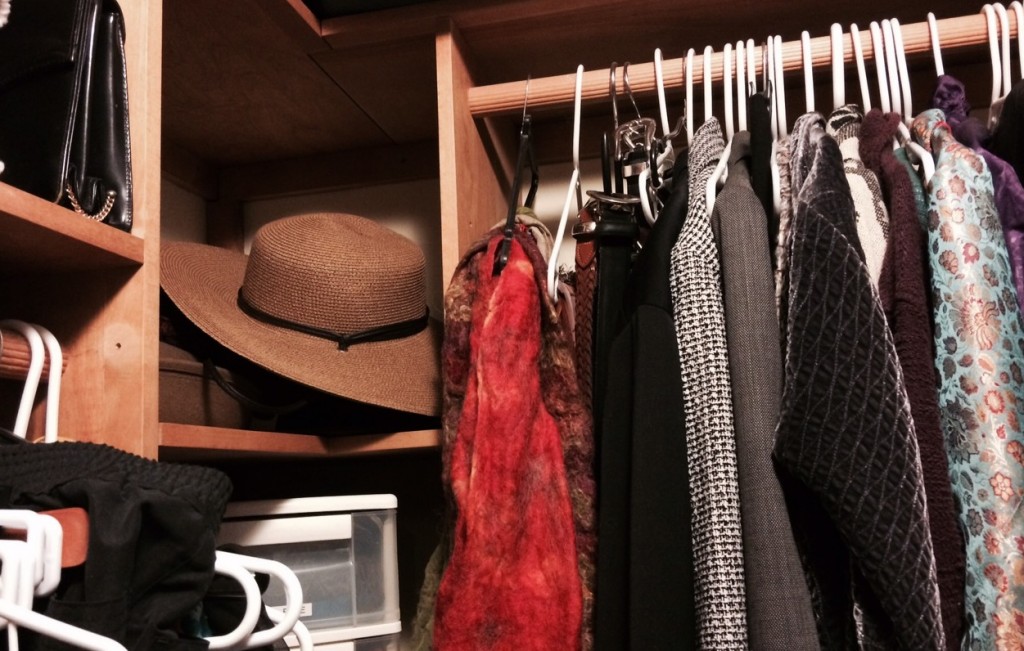
This weekend I cleaned my closet. Not exactly an earthshaking event, but a task I’d avoided while my closet slowly slipped into chaos. Cleaning it was always a low priority compared to the great stuff I wanted to do, like writing this blog.
But my husband, who shares the closet with me, had a different perspective. The disorder was getting to him. So this weekend, the closet became my priority. And I ended up discovering more than I anticipated.
My first discovery was that I had more stuff than I knew. I have a small closet, so things gets jammed in the back and hidden. Yet as I started pulling out scarf after scarf, I had my epiphany:
I didn’t even know what I had.
I found scarves I had taken from my mother’s apartment when she moved into her assisted living unit, which I had barely looked at and never worn. The scarf my wonderful friend Madie brought me back from Cambodia was peeking out from behind some hats.A beautiful orange and russet felted scarf, given to me by a local artisan when my husband was in the hospital, lay hidden underneath a sweater. I was beginning to see a pattern: I had forgotten a lot of what I had. And that made me pause and wonder.
How can I appreciate fully, if I don’t even know what I have.
As I sorted and folded the scarves, I started remembering the stories living in each of the scarves. And as I did, I began to feel my gratitude and my abundance.
Appreciating and really owning what I have was a first step to abundance.
I smiled and saw that in my closet were many things. I had enough. And I didn’t need to go out shopping for more!
Stuff, or a large income, doesn’t necessarily lead to a feeling of abundance, in which I feel full, grateful and can savor what I have. When I lived in Ecuador in my early twenties, I made next to nothing and slept on a mattress on the floor. My belongings fit into two suitcases. Yet I experienced more abundance during my years in Ecuador than years later when I was well along in my career and earning a good salary. In the mountains of Quito, working as an occasional tutor, I experienced my life as a creative adventure every day.
For me, that’s abundance.
Another epiphany came to me as I contemplated the situation: I saw that I had gone to sleep and stopped noticing what was in front of me. I had learned to turn my back on the mess, ignore the closet, and just pull out things I wanted to wear with my eyes half closed. I tried to justify my numbness by telling myself that the closet was too small. But it was time to change.
Part of appreciating is learning to notice anew.
I’ve travelled and worked on five continents. And after my trips, when I returned from some remote part of the world (like Bamako, Mali) I spent time walking around in amazement, noticing things we take for granted in this country – like soft toilet paper. Yet soon or later, I invariably slipped back into numbness and the awe faded away.
By holding on to more than I had (or knew that I had), I had no space left to appreciate and receive.
The first step in my closet reform strategy was to pack up my summer clothes and create some space. My second step was to decide what to take to the thrift store. I wanted space.
Sometimes the stories my belongings carry make it hard to give them away. I still have more than I need. But I’ve started the process – and made sure that everything I’m keeping is what I need – for now – or else it gets to go to someone else.
I don’t want to be numb to what I’ve been given.
A final step has been to look at the closet and say thank-you, offering a small blessing for what I’m keeping and what I’m giving away.
The process has been confronting and a perfect way to prepare for Thanksgiving. I want to start noticing again, to appreciate, to give, and to be grateful for what has been given to me.
Thank you dear closet. Thank you all. And Happy Thanksgiving.










One Response
So, this comes down to your stuff owning you. As you point out, or at least imply, our stuff is our story and it is very hard to let go of parts of our story. Maybe the distinction is not in hanging on to everything, but in cherishing the memories (stories) that are attached to our “stuff.” By learning to give it away, we are learning to pass on our stories and enrich the lives of others.